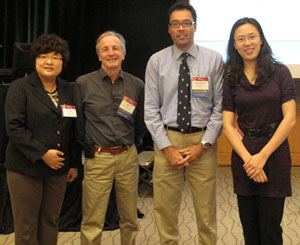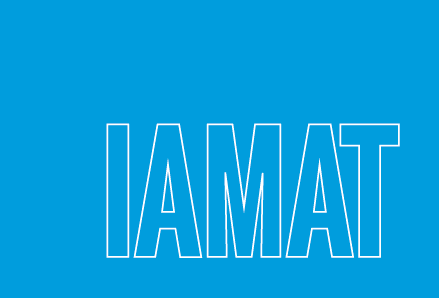We recently had the chance to skype with Tian Lingling (Sandy) and Tian Rui (Tatiana). Our 2011 scholars just completed a six-week intensive training course in travel medicine at the Kaiser Permanente Honolulu Travel Health Center. This scholarship program is sponsored by IAMAT, thanks to the generous support from our members.
Currently, our scholarship program focuses on training Chinese scholars since China is one of the major travel destinations in the world. We are grateful to Dr. Vernon Ansdell, Dr. Johnnie Yates, and their colleagues at the Honolulu clinic for their invaluable mentorship.
| Some background…
Tatiana is a general practitioner from Beijing and has 3 year old twins. Her work at the Beijing International Travel Healthcare Center involves doing physical checkups for travellers coming to China. Her clients are mostly travellers, expatriates, and students from the USA, United Kingdom, Australia, Korea, and Japan. Tatiana likes travel medicine because it’s an interdisciplinary field; travel health providers need to have a working knowledge of geography, epidemiology, international medicine, tropical medicine, just to name a few. Sandy is also a general practitioner and works at the Jiangsu International Travel Healthcare |

From left to right: Tatiana, Dr. Vernon Ansdell, |
She performs physical examinations for Chinese workers going abroad as well as for Chinese travellers and students mostly headed to the USA and Europe. The most interesting aspect of travel medicine for her is immunology – how vaccines are developed, the mechanics of protection, and understanding possible side effects.
What the scholarship means to them
Sandy says that the scholarship has given her the confidence to deal with different clinical situations, “It is a good opportunity for me to learn more about travel medicine and turn my knowledge acquired from books into practical skills to protect travellers. I was not sure how to approach cases before the training, now I have a sense of how to handle it and what I should pay attention to when a traveller comes to see me. The training is very helpful to us.”
For Tatiana, the scholarship gives her the skills to improve her travel health consultations and an opportunity to advance her professional goals. “It really has helped me a lot. It has given me the chance to be trained by experts in the USA, leaders in travel medicine. It has broadened my view of travel medicine practice and given me a lot of information to take back to my clinic in China,” she says. Sandy adds, “When I go back to China I can use this information to give consultations and give much better services for my patients who will travel all over the world. It is very important for my career.”
How they plan to help travellers
Both scholars emphasize how the training has changed their approach to travel health practice. One key lesson learned is the need to provide detailed and thorough travel health consultations. “In China, we generally do not provide detailed consultations. Doctors administer travel vaccinations while providing the traveller with little advice and information on how to protect themselves,” says Sandy.
Back home, they will teach their colleagues consultation best practices to ensure that the traveller can make informed choices. They learned that a successful visit involves giving advice tailored to the traveller’s health needs and paying attention to the client’s destination, trip itinerary, current health status, vaccination history, type and length of travel. Says Tatiana, “The goal is about enjoying travel, but getting the right information to ensure a healthy trip.” Sandy agrees. She learned that many travellers feel that there is very little risk abroad, but if they do get sick, there are big consequences. “I want to prevent them from getting sick and protect them better, to make travel much safer so that they can enjoy it with minimal risk.”
Learning about common infections like malaria in returning travellers was also part of the scholars’ training. Tatiana is looking forward to developing protocols in her clinic to detect post-travel related infections. “When I return to China, I want to do research and write an article to raise awareness among doctors, who are not travel medicine specialists, on how to deal with post-travel infections. I want to break down the barriers between general medicine and travel medicine.”
A typical day at the clinic
Everyday Tatiana and Sandy interacted with people travelling all over the world. Starting at 8am with consultations, they saw travellers from different backgrounds and health conditions. Finding solutions to ensure a healthy trip for a traveller with environmental allergies or a senior with mobility challenges taught them the dynamics of travel health. Considering the risk of yellow fever, malaria, travellers’ diarrhea, jet lag, altitude sickness, food poisoning, mental health concerns, culture shock, air pollution, adverse reactions to medications, and understanding travel medical insurance are all part of the training. They also participated in rounds at the Kaiser Permanente Ambulatory Treatment Center, including the HIV clinic and Hepatitis clinic.
Part of the day was also dedicated to individual study and case study research, as well as making weekly lunchtime presentations to their colleagues on various aspects of travel medicine, including travellers’ diarrhea, Hansen’s Disease (also known as leprosy), leptospirosis, and risks affecting immuno-compromised travellers.
Benefiting from experiential learning
Their training also took them to a travel medicine conference in San Diego to learn about the latest developments in the field and to network with experts. Sandy and Tatiana also had the opportunity to visit Houston to explore research possibilities on travellers’ diarrhea.
They also went to Tijuana, Mexico where they learned about the risk or rabies, Hepatitis B (due to many tattoo shops in the area), road injuries, and travellers’ diarrhea, common risks in Mexico. It was an eye opener for both of them. Being away from home has made Tatiana pay more attention to food and water safety, living conditions, cultural differences, and how these affect travellers. Hands on training also occurred on Molokai Island, in Kalaupapa, a former leprosy colony. The scholars learned about Hansen’s Disease and made comparisons with the situation in China.
On their days off, Sandy and Tatiana enjoyed sightseeing, going to Pearl Harbour, Kilauea volcano, exploring the parks and beaches, eating Hawaiian specialties, as well as snorkeling. An eighteen hour difference separated the scholars from their families, but keeping in touch by internet made it easier. “It’s hard to be away, but it’s worth it! This is really a fascinating, challenging but rewarding training experience.” says Tatiana.
Says Sandy, “I really appreciate the chance that you provide for us to train at the Kaiser Permanente clinic. The doctors here are very nice, taking good care of us, and teaching us the vocation. It’s a wonderful experience for us that we will never forget.”
To learn more about our scholarship program, go to: Travel Medicine Scholarships.



